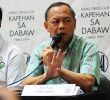Adam Shaw, a mission intern who hailed from Brunswick, Ohio said that no matter who gets elected, “the policy of the US government in Southeast Asia is going to be the same” adding that US presence here continues because of the country’s huge natural resources.
By MARILOU AGUIRRE-TUBURAN
Davao Today
DAVAO CITY, Philippines — As the American people are about to elect their new leader in the United States (US) November 6 (November 7 in the Philippines), mission interns from the General Board of Global Ministries of the United Methodist Church said that this is going to be “very crucial” for the US citizens, especially in the next four years.
Incumbent US President Barack Obama and his Republican challenger Mitt Romney will wait for the American people’s decision who, in an indirect vote, will cast ballots for a slate of members of the Electoral College. The latter will directly elect the President and Vice President.
A total of 538 electoral votes are available under the Electoral College System. This means, Obama and Romney will have to get 270 votes to win the US presidency.
The current state of US economy
In an interview over a local radio station here, Laura Wise, a native of Texas in USA, said that the US is “a crazy place right now” with her family seeing the drastic economic downturn.
She said, it has directly affected her and her family with her grandmother’s healthcare currently on government assistance while she was unemployed at one point after being laid off from her job.
The US economy, according to Wise, is still suffering from financial crisis since 2008, the year when Obama won the presidential election.
“People are still without jobs. There are still major issues that we’re dealing with like education and immigration and foreign policy issues,” she said.
Wise was here since August this year, serving her international assignment as a mission intern with the Initiatives for Peace (InPeace) in Mindanao.
She also discussed that because of the government policy and those who are in power, the Occupy Wallstreet movement which was led by majority of the working people in US happened in 2011.
“Obama bailed out the banks. But at the same we bailed them out for their irresponsibility, greed and for taking advantage of people who have saved their whole lives so they can make their own personal profits,” she pointed out.
The Occupy movement, she said, was a way to “forward a new agenda for the (ordinary) people of US” who comprised 99 percent of the population while only one percent “makes more money and owns almost everything.”
While the US is suffering from financial crisis, she said that the “ruling elite” who are either CEOs (chief executive officers) or owners of big companies are benefitting from this.
“They are reaping the benefits in all the changes that are happening and are coming downward. We are being displaced while they (the one percent) continue to make more money and give themselves bonuses. It’s a vicious ugly cycle,” she said.
Former Bayan Muna Representative Joel Virador, in the same radio interview, said that the US has been suffering from “overproduction,” it being an “imperialist country.”
Overproduction, in economics, refers to excess of supply over demand of products being offered to the market. It is also attributed to too much capital being invested in industry in the attempt to claim a share of the available profits.
“The US has denied jobs intended for the American people. It has outsourced jobs to Asian Pacific countries like China and the Philippines where workers are paid very cheap,” he said.
Continued US presence
Adam Shaw, a mission intern who hailed from Brunswick, Ohio said that no matter who gets elected, “the policy of the US government in Southeast Asia is going to be the same” adding that US presence here continues because of the country’s huge natural resources.
He also noted that with the ongoing dispute on the Scarborough Shoal between China and the Philippines, the US government will eventually “step in on the side of the Philippines.”
“If the Philippines loses the island, in effect, the US loses it. The focus of the US is more towards the resources. If they find a large oil deposit underneath the island, then they will not let it go to China,” he explained during the radio interview.
He also noted that the US government is banking more on war economy saying “Most of the budget goes towards military armaments and weapons.”
As the US citizens wait who will rule them in the next four years, Virador said that the outcome of the US elections also affect the Philippines “big time.”
“Since time immemorial, the country has been a puppet of the US government through its elected presidents,” he said, adding that the country’s economic policies have been largely dictated by the US imperialism. (Marilou Aguirre-Tuburan/davaotoday.com










